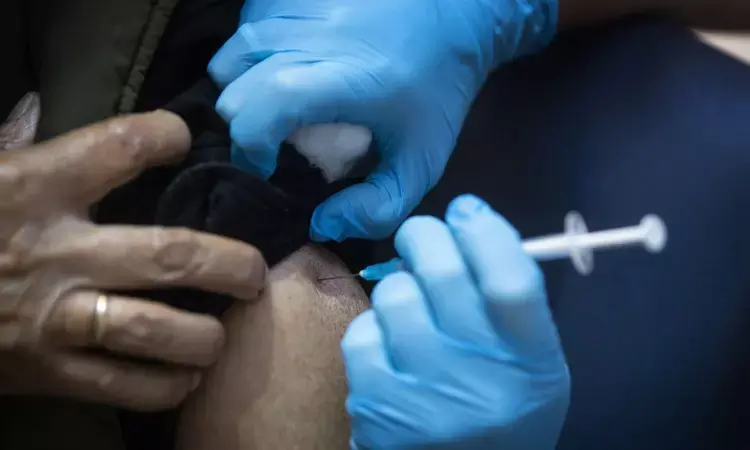- Home
- Medical news & Guidelines
- Anesthesiology
- Cardiology and CTVS
- Critical Care
- Dentistry
- Dermatology
- Diabetes and Endocrinology
- ENT
- Gastroenterology
- Medicine
- Nephrology
- Neurology
- Obstretics-Gynaecology
- Oncology
- Ophthalmology
- Orthopaedics
- Pediatrics-Neonatology
- Psychiatry
- Pulmonology
- Radiology
- Surgery
- Urology
- Laboratory Medicine
- Diet
- Nursing
- Paramedical
- Physiotherapy
- Health news
- Fact Check
- Bone Health Fact Check
- Brain Health Fact Check
- Cancer Related Fact Check
- Child Care Fact Check
- Dental and oral health fact check
- Diabetes and metabolic health fact check
- Diet and Nutrition Fact Check
- Eye and ENT Care Fact Check
- Fitness fact check
- Gut health fact check
- Heart health fact check
- Kidney health fact check
- Medical education fact check
- Men's health fact check
- Respiratory fact check
- Skin and hair care fact check
- Vaccine and Immunization fact check
- Women's health fact check
- AYUSH
- State News
- Andaman and Nicobar Islands
- Andhra Pradesh
- Arunachal Pradesh
- Assam
- Bihar
- Chandigarh
- Chattisgarh
- Dadra and Nagar Haveli
- Daman and Diu
- Delhi
- Goa
- Gujarat
- Haryana
- Himachal Pradesh
- Jammu & Kashmir
- Jharkhand
- Karnataka
- Kerala
- Ladakh
- Lakshadweep
- Madhya Pradesh
- Maharashtra
- Manipur
- Meghalaya
- Mizoram
- Nagaland
- Odisha
- Puducherry
- Punjab
- Rajasthan
- Sikkim
- Tamil Nadu
- Telangana
- Tripura
- Uttar Pradesh
- Uttrakhand
- West Bengal
- Medical Education
- Industry
Bengaluru Doctors warn of negligence in administering anti-rabies vaccine

Karnataka: The negligence demonstrated by people in administering dog bite vaccinations is a matter of serious concern, as noted by experts. Doctors have voiced their opinion that it's imperative to address the issue promptly as individuals are seeking anti-rabies vaccines from hospitals two days after a dog bite.
Dr K Krithika, who serves as the Nodal Officer for the Prajavani Rabies Control Programme, draws attention to a prevailing misconception among some people: the belief that vaccination is unnecessary when bitten by a pet dog. Dr Krithika ardently contends that irrespective of dog ownership, immediate treatment should be sought for any dog bite, just as one would for a stray dog bite. She finds it disconcerting that numerous dog bite victims delay their hospital visits for several days, deeming this approach incorrect. Furthermore, she places great emphasis on the necessity of adhering to a consistent vaccination schedule without any gaps.
A request has been submitted to the government, outlining plans to launch an exclusive anti-rabies clinic at the district government hospital. The clinic will only be operational once all the necessary facilities have been organized and prepared.
According to a report in the Deccan Herald, approximately 70 people are given anti-rabies vaccines every month, and at least two individuals requiring the immunoglobulin vaccine due to deep injuries or dog bites on the face and neck are also treated.
It is essential to emphasize that even if pet dogs are immunized against rabies, receiving the rabies vaccine is imperative when bitten by any dog. The same holds true if a dog licks an open wound. Furthermore, it's critical to be aware that rabies can be transmitted through bites from a variety of animals, including monkeys, cats, horses, and more. In the event of a bite from any of these animals, prompt medical consultation is essential.
When bitten by a dog, cat, or any other mammal, it is of utmost importance to take immediate action. The initial step involves promptly cleaning the wound with soap and water to minimize the risk of infection. Following this, it is imperative to promptly consult a medical professional for an assessment and potential intervention, especially concerning risks like rabies. Additionally, to ensure robust protection against rabies, it is vital to adhere to a regular vaccination schedule as advised by healthcare experts. Equally critical is the completion of the entire vaccine regimen without any lapses, as this plays a pivotal role in securing one's health and well-being when facing the potential threat of rabies exposure.
Public health officials, medical professionals, and experts are united in their efforts to ensure that individuals receive timely and appropriate care to combat the risks associated with rabies exposure.


